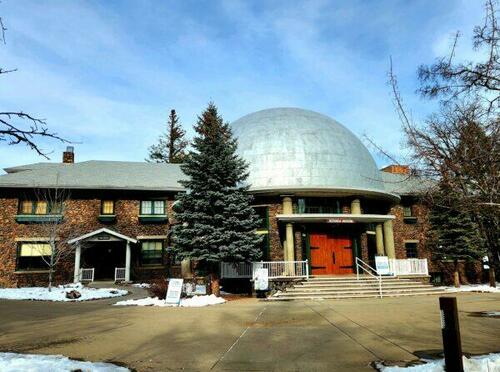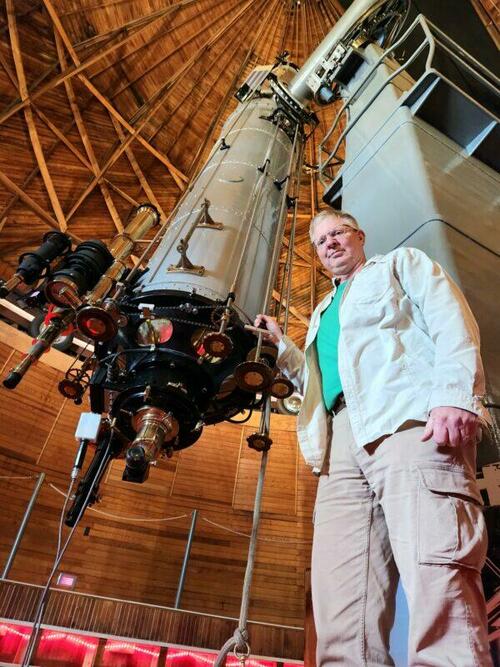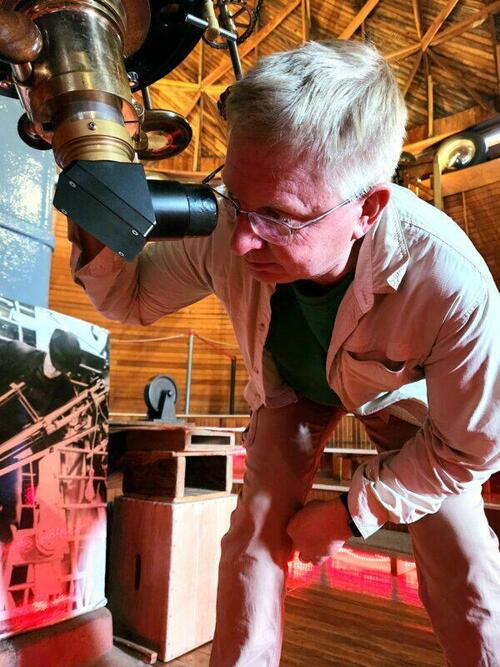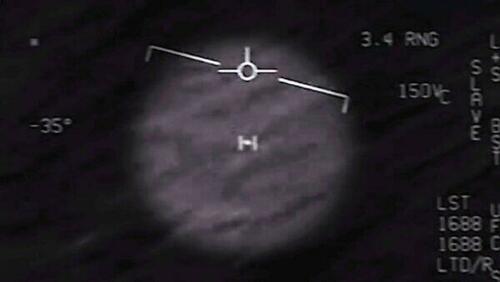UFO Topic Continues To Stir Debate With More Sightings, Studies
Authored by Allan Stein via The Epoch Times (emphasis ours),
The truth about unidentified flying objects (UFOs) is still out there.
Yet every so often, the Lowell Observatory in Flagstaff, Arizona, gets a phone call about an unusual sighting in the night sky.
Is it a UFO—or something else?
Lowell Observatory historian Kevin Schindler says mostly it is a natural occurrence, like the planet Venus shining bright after sunset.
And then those are tongue-in-cheek moments such as the letters that suggested there were extraterrestrials from Cassiopeia.
“We do have a variety of people asking things like that,” Schindler says.
But, UFO researchers say some cases defy explanation and include eyewitness reports from credible sources—from military people to commercial pilots.
These sightings have taken the debate over UFOs to a new and sober level—to such an extent that the government formed an Unidentified Aerial Phenomena Task Force (UAPTF) in August 2020 to study the topic in detail.
In its unclassified report, “Preliminary Assessment of Unidentified Aerial Phenomena,” dated June 25, 2021, the task force concluded that the subject of UAPs is worth further study and research funding.
However, the report would not acknowledge an extraterrestrial origin.
Unidentified Aerial Phenomena “pose a safety of flight issue and may pose a challenge to U.S. national security,” the report to congressional intelligence officials warned.
While available reporting on UAPs is “largely inconclusive,” the report said sightings fall into five categories: airborne clutter, natural atmospheric phenomena, U.S. Government or industry development programs, foreign adversary systems, and “other.”
The report added that a few UAPs demonstrate advanced technology, though most reports “probably lack a single explanation.”
In October 2022, the National Aeronautics and Space Administration (NASA) announced the formation of an Unidentified Anomalous Phenomena Study with 16 members versed in the subject.
“Exploring the unknown in space and the atmosphere is at the heart of who we are [and] the language of scientists is data,” according to a NASA fact sheet.
The independent study group will examine UAP data over the next nine months and report on its findings around mid-2023.
NASA asserted it is “going in with an open mind, and we expect to find that explanations will apply to some events and different explanations will apply to others.”
“We will not underestimate what the natural world contains [and] there is a lot to learn.”
NASA press secretary Katherine Rohloff said the study aims to identify data from the civilian government, commercial, and other sources that can shed light on UAPs.
Using that data, the space agency will recommend a “roadmap” for future UAP analysis.
In July 2022, the U.S. Department of Defense (DoD) announced the establishment of the All-Domain Anomaly Resolution Office to examine and assess potential aerial threats near military installations.
The DoD said UAPs include anomalous, unidentified space, airborne, submerged, and “trans-medium objects.”
“Put simply, UAPs are objects that, when encountered, cannot be immediately identified and may exhibit anomalous behavior,” said DoD press operations spokeswoman Sue Gough.
Gough cautioned that the lack of attribution “does not necessarily indicate the significance of each sighting or a threat to national security.”
“Anomalous behavior means that DoD operators or sensors cannot make immediate sense of collected data, actions, or activities,” Gough told The Epoch Times in an email.
Gough said that by combining data collection with rigorous science, “any object we encounter can likely be isolated, characterized, identified, and, if necessary, mitigated.”
The DoD’s position is to collect as much data and see where it leads.
Gough added, “We will not rush to conclusions in our analysis. In many cases, observed phenomena are classified as ‘unidentified’ simply because sensors [could not] collect enough information to make a positive attribution.”
Since the purported crash of a UFO took place in Roswell, New Mexico, in 1948, the idea of visitors from other planets has captured the public’s imagination like no other.
There have been thousands of reports of UFOs over the years since, ranging from direct sightings of strange lights and actual craft to alien abductions.
Incidents such as these sparked a series of investigations by the U.S. Air Force, beginning with Project Sign in 1947, Project Grudge in 1948, and Project Blue Book from 1952 to 1969.
The studies looked at more than 12,000 reported sightings in total, concluding UFOs were not a national security threat or of extraterrestrial origin.
People who study UFOs are known as “ufologists.” And many ufologists, like documentary filmmaker Ron James of the Mutual UFO Network (MUFON), believe ample proof exists that UFOs are here and not of this world.
More importantly, the government knows this.
“When we say government, we’re not talking about guys at the Pentagon,” said James, MUFON’s director of public relations.
“We’re talking about programs buried for years away from the institutional memory of the armed forces in pseudo-government, private ventures that are accountable to nobody and impossible to penetrate with the FOIA [Freedom Of Information Act].”
James’s latest project, “Accidental Truths,” seeks to address the government’s “new narrative” of UFOs and the key people involved in concealing their existence.
The 90-minute film’s release is due in early 2023.
James said MUFON amassed a growing database of 120,000 UFO sightings and encounters since the group’s founding in 1969, receiving hundreds more cases each month.
He said at least 97 percent of cases MUFON receives and investigates have a natural explanation, like the weather, satellites, or aircraft.
The other 3 percent can’t easily be explained and requires further study.
“When you talk about the field [of UFO research], you don’t cover it in one umbrella,” James told The Epoch Times. “Many of these avenues are conjecture, testimony, little documented evidence—which is fine.
“Things that are science fiction today are science fact tomorrow.”
More than 70 years after the Roswell incident, James said we know “something is going on.”
“We don’t know exactly [but] we have a pretty good idea.”
While Roswell catalyzed interest in UFOs, references to strange flying objects appear in texts going back to biblical times, James said.
“This topic has been at the forefront of our culture and the general population since the 40s. Since the Roswell thing took off.”
In December 2017, the New York Times published an article exposing what it said was a secret Pentagon program to investigate UFOs beginning in 2007.
Former U.S. Senate majority leader Harry Reid (D-Nev.) reportedly obtained funding for the program.
However, James said government investigations into UFOs amount to little more than a “dog and pony show.”
“That’s how it’s been from the beginning. The acronyms [for the studies] are adding up,” James said.
Through “compartmentalization” of various government entities, “it gives them the ability to say we don’t know anything about [UFOs], even though it’s a real thing,” James said.
“By compartmentalization—and by what we call ‘stovepiping’—they’re able to sequester information. And then they have plausible deniability.”
James believes there is a power struggle within certain levels of government between those who wish to cover up the extraterrestrial origin of UFOs and those who want to expose it.
He said the government acknowledging the reality of alien technology and energy sources would be Earth-shaking.
“It would destroy every paradigm, every power structure, every means of control that keeps the planet in check. It’s all about energy. Whoever controls the energy controls the entire planet,” James said.
Despite official denials of non-terrestrial UFOs, sightings of strange objects continue to this day.
The National UFO Reporting Center (NUFORC), a national clearinghouse of information on unidentified aerial sightings, has logged more than 150,000 reports over 47 years of operation. The center in December posted 1,255 new UFO sightings on its website.
On Nov. 7, NUFORC received a report from multiple airline pilots describing a “dramatic display” of lights over the midwestern United States the night before.
“Moreover, several other flight crews allegedly reported the same event over their backchannel, so-called ‘guard,’ radio frequency, and discussed the event extensively over an estimated 20-25 minutes,” according to NUFORC’s website.
James said the UFO debate is far from over yet he doesn’t believe the new investigations will reveal anything significant.
“It’s not going to reveal anything we don’t already know. If [the government] can drag it out for another 50 years, they’ll do it,” James said.
“At some point, they will have to acknowledge the existence of non-human intelligence. Where it goes after that depends on what that relationship is about.”
One organization focused on the search for advanced extraterrestrial civilizations through radio signals is SETI (Search For Extraterrestrial Intelligence).
SETI began as a government program in 1960. However, questions over its scientific value led Congress to terminate it in the 1970s, though SETI researchers reorganized privately in the 1990s.
SETI senior astronomer Seth Shostak said there has been no shortage of UFO reports since he joined the organization.
“I get a phone call almost every day from someone having difficulty with aliens in their personal lives,” Shostak said. “It’s not a new phenomenon for me.”
Shostak agreed that public fascination with UFOs remains high while conspiracies of government cover-ups abound.
“The fundamental fact is that ever since the 1960s, poll after poll has shown that one-third of the American populace believes that the aliens are buzzing the skies. Many call me up,” Shostak told The Epoch Times.
Shostak said every time a new UFO study group enters the media cycle, it only stirs hope “that something new will happen,” and Americans “love a conspiracy.” But the evidence regarding alien visitation is doubtful. Otherwise, we’d see them in our everyday lives.
“Maybe the aliens have lost interest or have been repelled by the fast food,” he joked. “If the aliens were visiting—if there were good evidence of that—you’d have thousands of scientists looking into this.”
“They’d be beavering away at this every day,” Shostak told The Epoch Times. “What could be more important than the idea extraterrestrials have decided to come to Earth for—whatever reason? And they’re not doing that. That means [scientists] are not convinced.”
The late American astronomer Percival Lowell, founder of the Lowell Observatory in 1894, stands out among 20th-century scientists who believed in life on other planets.
Schindler said Lowell, from a wealthy Boston family, built the observatory housing its 24-inch refractor telescope to prove the existence of aqueducts, or “canals,” made by intelligent beings on Mars.
Lowell was not “one of these wacky guys with all these crazy ideas,” Schindler said. “He was well-educated and went to Harvard because he was a Lowell.”
“He started [the observatory] because he wanted to prove there was life on Mars.”
Lowell would also study the field of planetary formation and how the solar system might have evolved, theorizing the existence of a ninth planet—Planet X.
Lowell died in 1915, though his research would inspire other astronomers to carry on, leading to the discovery of Pluto on Feb. 8, 1930.
“It’s interesting he wanted to prove there was intelligent life on Mars and didn’t—wanted to discover a planet and didn’t. He probably went to his grave unfulfilled in some ways because he didn’t do that one big thing,” Schindler said.
Read more here…
Tyler Durden
Thu, 12/29/2022 – 23:40
via ZeroHedge News https://ift.tt/znxHh9w Tyler Durden





